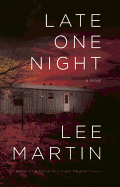
Ronnie Black denied involvement, but the people of Goldengate, Ill., horrified at what happened out at Della Black's trailer, are eager to assign blame. In the taut, suspenseful Late One Night, Lee Martin (The Bright Forever; Such a Life) reveals the consequences of a rash act and its impact on a community, infusing his characters with anger and guilt, regret and compassion.
In this one-main-street Plains town, folks have known each other for generations. When Ronnie and Della got into a "snort and holler" right in the sundries store, neighbors heard, and when Ronnie left Della and their seven kids for Brandi, they gossiped. So everybody wondered: Was Ronnie guilty of setting the fire that trapped Della and their three youngest children that blustery January night? Martin parcels out hints to the mystery, but life in Goldengate goes on, and his characters develop as they react. Crotchety neighbor Shooter Rowe thinks ill of Ronnie, but Captain, his disabled son, adores him. Godparents Missy and Pat seek custody of the surviving children, but Missy frets that she's misjudged Ronnie. Brandi, pregnant with Ronnie's baby, desperately believes he's innocent. Even Ronnie, despite evidence implicating him, evokes sympathy.
The blacktop road leading to the trailer in a barren cornfield, wisps of snow snaking across the road, the blue-gray winter skies evoke the spare Goldengate life and the town's sorrow. But redemption comes with forgiveness and generosity, and "a chance to do something good, to let people know they weren't alone." In the end, Martin's story inspires hope. --Cheryl Krocker McKeon, manager, Book Passage, San Francisco

